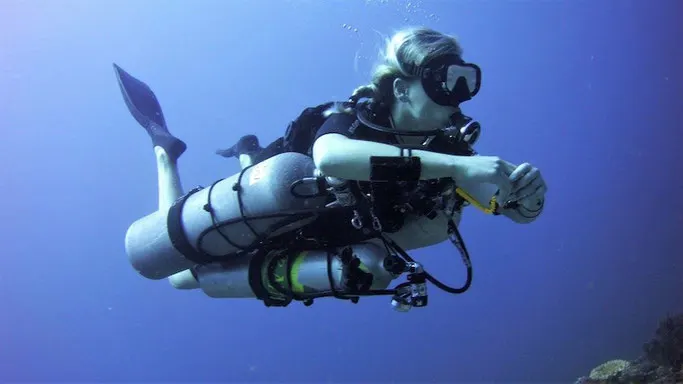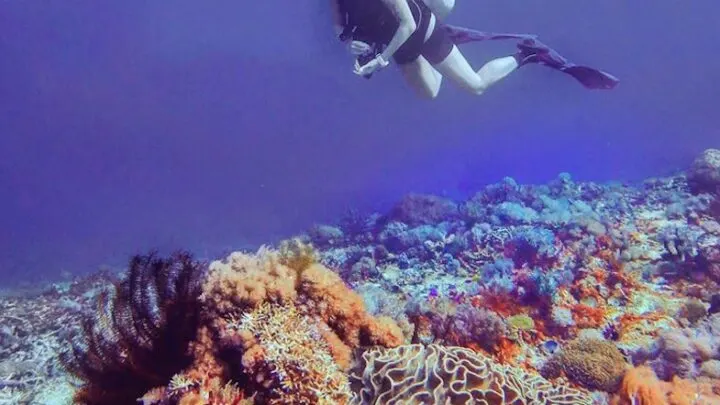At Girls that Scuba we talk a lot about anxiety in scuba diving because we think it’s incredibly important to open up the conversation and normalise this experience. Whenever the conversation is opened up in our 50,000 strong Facebook group, the topic is met with gratitude from divers who’ve felt their experiences have been ignored by the wider community. We want to make it easier to speak out about anxious experiences, and to equip divers with basic knowledge on how to recognise and help with anxiety underwater.
Read on to learn why we need to normalise anxiety in scuba, how you can prevent anxious situations arising, how to recognise an anxious buddy, and what you can do to help them.
Anxiety in diving is normal
It’s important to remember that when we’re scuba diving we’re quite literally plunging ourselves into a totally alien environment. We’re not designed to breathe underwater, so it can be a lot for our brains to get past to tell us that it’s okay to be doing what we’re doing. With that in mind, a little anxiety in scuba diving is perfectly normal and most divers will experience it at some point in their scuba journey. Whether it’s nervousness whilst completing your mask skills in your Open Water Course, anxiety when diving in a strong current for the first time, or a little discomfort when diving in lower visibility than you’re used to, it’s all perfectly okay – these are valid emotions to experience.
However, it’s also important that we recognise the difference between these small incidents of situational anxiety and longer term diagnosed mental health conditions. Whenever you complete any dive training you’re required to fill out a medical form to disclose any conditions which may have an impact on scuba diving. If you do have any of the medical conditions which can affect your ability to dive, you will be required to seek approval from your doctor. If you have a diagnosed anxiety disorder or history of panic attacks, this means you will have to tick the box to disclose your medical history and discuss further with your doctor.
This is not designed to exclude you from scuba diving. It’s done in order to keep both you and your instructor safe and comfortable. From an instructor’s perspective, it’s extremely important to know if a student has a history of panic attacks before you take them on a dive. Honesty and communication are incredibly important when discussing anxiety in scuba diving, so it’s important that you apply this honesty when filling out your medical form. The more we can have these open conversations, the more we can work towards normalising the experience of anxiety in diving.
How to prevent anxiety on a dive
An important skill which can help prevent anxiety whilst scuba diving is being a great buddy. Strong communication is always a great starting point for a successful, anxiety-free dive. If you’ve experienced anxiety on dives in the past, discuss this with your buddy or divemaster to let them know any situations which you think may trigger these anxious feelings. This doesn’t have to be intimidating – if your briefing is delivered in a large group, ask the divemaster if you can talk to them afterwards. If you find it helpful, you can come up with a plan of action in case you do experience some discomfort. Consider discussing how you would signal that you’re feeling anxious, and what you would want your buddy to do in that situation.
This is equally important even if you’ve never experienced anxiety on a dive yourself. You never know when a small anxious feeling might arise and take you by surprise, so being prepared is always useful. It can be as simple as asking your buddy “how are you feeling about this dive?” and offering up the opportunity to share their concerns. Whether you’ve experienced anxiety or not, remember that it’s always okay to cancel any dive, at any time, for any reason.
How to recognise an anxious diver
Like any psychological state, every person will respond to anxious feelings in different ways. However, here are some tell-tale signs to look out for which may indicate that a diver is feeling anxious underwater.
Staying close – If your buddy is feeling uncomfortable, they may want to be a little closer to you than normal, perhaps even looking to hold your hand or hold onto part of your equipment. If this is comfortable for you (and if it’s safe to do so and doesn’t pose a risk of entanglement or damaging anyone’s equipment), this can be a helpful way to ease someone’s discomfort.
Excessively checking equipment – If you’ve noticed your buddy is checking their gauge or dive computer a little too often, there’s a chance they might be feeling a bit nervous. If you’re diving with a new buddy it can be difficult to tell what’s normal for them, but if they appear to be looking extra closely at their gauges it might be worth checking that they’re okay.
Heavy breathing – A sudden jacuzzi of bubbles above your buddy’s head could be a warning that they’re not feeling great. Keep an eye out for excessively heavy breathing if you’re noticing lots of excess bubbles and heavy movement in their chest.
Unusual swimming – Sudden jerky movements, such as turning and looking around a lot or laboured finning, can be an indicator of anxiety. Again, this can be more challenging if you’re with an unfamiliar buddy, but taking a few moments to see what their normal swimming style is like can help you notice when things have changed.
Facial expressions – The eyes are the window to the soul, after all, and this is a reliable way to tell if your buddy is relaxed or not. A wide-eyed, blank staring look can indicate the early onset of panic, so when you’re checking in on your buddy periodically through the dive make sure you’re making strong eye contact. It’s important to know if your buddy is using a tinted mask as these can make it much more challenging to see their facial expressions.
How to help an anxious buddy

Now that you know some ways of recognising an anxious diver, you’re probably wondering what you can do to help. If you’ve followed the earlier advice of practicing strong communication, you’ll hopefully know exactly how your buddy would like to be helped out. If you’ve skipped that step or just want to be prepared for any scenario, here are some simple techniques that you can try.
Stop. Breathe. Think. Act. The mentality you take in reacting to an anxious buddy is just as important as the action you take. It’s important to take a moment to think through how you’re going to respond, rather than just reacting on instinct. Stop to assess the situation. Take a few breaths to steady your own mental state. Think through the steps that you’re going to take. Act on what you’ve decided will work for you both in that moment.
Okay? Okay – This is likely the first signal you ever learned when diving, and it’s one of the most powerful in this scenario. Sometimes all it takes is asking if your buddy is okay, and just knowing that you’re there with them can help to calm them down. It also gives them the opportunity to tell you that no, they’re not okay, and explain why. Alternatively, sometimes simply signalling okay and pointing at them to tell a diver that they’re okay, rather than asking, can help to ease their nerves.
Take a break – There’s nothing worse if you’re feeling nervous than powering on through to keep up with the group swimming on ahead. Take the time to stop and breathe together. Signal stop, with an outstretched hand held up, and signal slow, steady breathing by moving an open hand back and forth from your regulator. Encourage your buddy to breathe in time with you until they have calmed down. Remember the importance of maintaining eye contact when assessing how they’re feeling. Once you’ve both given the okay you can continue the dive, but remember that it’s always okay to choose to end the dive for any reason.
How can I improve these skills?
Many of the techniques mentioned here are simple versions of skills you will learn on a rescue diver course. If you want to be prepared for any underwater scenario, from assisting anxious buddies to finding unconscious divers, a rescue course is definitely the best way to prepare yourself. Many divers consider their rescue course to be the most challenging course but also the most fun, and certainly the most educational.
Have you experienced anxiety on a dive? What did your buddy do to help you out? Share your story in the comments below or reach out on our Facebook and Instagram – we’re @girlsthatscuba!

